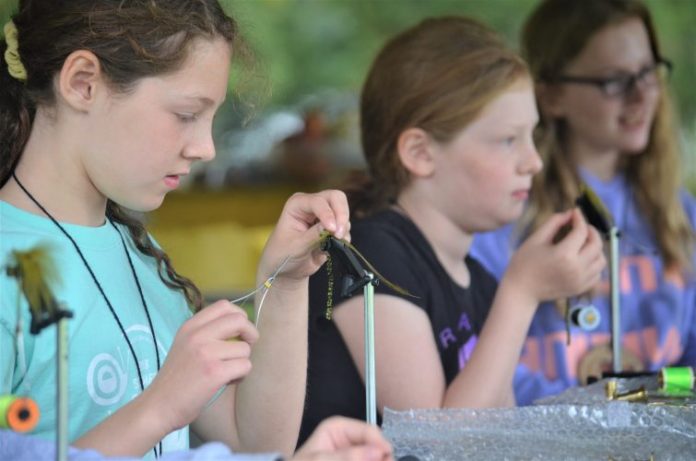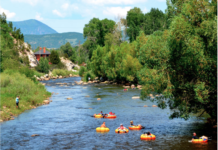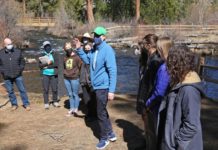Times Observer photo by Brian Ferry
STREAM Girls students (from left) Makenzie Dernoski, Claire Costanzo, Ellie Costanzo, and Aubrey Carrington practice tying flies with the help of Trout Unlimited volunteers at Chapman State Park.
Trout Unlimited, Chapman State Park, and the Northern Allegheny Outdoor Women’s Association worked together on the STREAM Girls program to introduce some local youth to the science and fun that can be found in their local waters.
“STREAM Girls is Trout Unlimited’s Watershed STEM program that builds confidence and breaks down barriers in science and the outdoors,” according to Trout Unlimited. “Through the eyes of a scientist, artist, and angler, girls make a personal connection to their home waters.”
STREAM is an acronym for — Science, Technology, Recreation, Engineering, Art, and Math.
The program was held this weekend at Chapman, utilizing the lake, Penny Run, grassy spaces, and pavilions.
Times Observer photo by Brian Ferry
STREAM Girls students (from left) Claire Costanzo, Ellie Costanzo, and Aubrey Carrington practice tying flies with the help of Trout Unlimited volunteers at Chapman State Park.
On Saturday, the girls walked the stream, measuring its width, and that of its riparian zone, identifying its characteristics, and those of its surroundings.
“The girls described the stream, including color and make-up of the stream bottom, in an effort to determine water quality,” Chapman Environmental Education Specialist Jen Moore said.
The species that live in a stream are a key factor in determining its quality. “The girls found crayfish, huge dragonfly nymphs, and small fish,” Moore said.
Pennsylvania Department of Conservation and Natural Resources Bureau of Forestry Seasonal Biologist Leigh Fehlman identified the plants and animals in and around the stream, including a dusky salamander, for the girls.
With the help of the Warren County Conservation District, Trout Unlimited, and DCNR, the girls conducted kick netting and a macroinvertebrate study. They concluded that Penny Run was a good quality stream.
Trout Unlimited’s Gary Kell took the discussion of macroinvertebrates and turned it to fishing.
With the help of volunteers from TU, the girls learned about tying flies and the basics of casting them — “the pick-up and lay-down, the roll cast, and the false cast,” Kell said.
After the practice, it was time to apply those new skills to a real-world situation — the TU volunteers helped the girls do some fishing in the lake.
“Jada Weiser was so excited to go fishing after the casting practice,” Moore said. “She caught a sunfish that afternoon. When her dad picked her up, she couldn’t wait to tell him and show him the fly ties she made.”
“That’s what the program is all about — sparking interest,” she said. “Hopefully they will become a life-long fisher woman and maybe end up working in an outdoor education field.”
The girls heard career information from some female role models in those fields — Moore, DCNR Cornplanter District Forester Cecile Stelter, and Warren County Conservation District Watershed Specialist Jean Gomory.
“Each one of us talked about our positions and how there are more women in these roles than in previous years,” Moore said.
Clear Creek State Park Environmental Education Specialist Suzann Rensel worked with the girls on a stream-flow activity. “The girls calculated the velocity of the stream in a 10-meter section by dropping a tennis ball in the stream and letting it float downstream,” Moore said. “Penny run is a slow-moving stream when the water level is low. It took so long that they started singing the Jeopardy theme.”
The ball reached the 10-meter mark after six minutes, she said.
Still, even a little bit of moving water is powerful. Rensel explained to the students that a few inches of fast-moving water can sweep a vehicle into deeper water.
After a scavenger hunt and making a bracelet that represented the parts of the stream, the girls sat around a campfire making mountain pies. “Some of the girls had never made one before,” Moore said. “They gained more experiences than just the scientific.”
“All girls received a patch and certificate upon completion of the program,” she said. “When asked what was their favorite part, answers were: fly casting, fly tying, and the stream. I’m glad they enjoyed those and learned a new skill. All the girls really had a good time and learned a lot.”
Credit: Source link






























